 Amphibious armored vehicle unit conducts open sea drill
Amphibious armored vehicle unit conducts open sea drill
 Water relay in Henan
Water relay in Henan
 Ethnic culture feasts eyes of travelers
Ethnic culture feasts eyes of travelers
 80 security dogs assembled in Nanjing police dog training base
80 security dogs assembled in Nanjing police dog training base
 Graffiti artists paint on street walls in Xinjiang
Graffiti artists paint on street walls in Xinjiang
 Story of ceramic artist Zhang Lingyun
Story of ceramic artist Zhang Lingyun
 Magic summer night dream in Hongyuan
Magic summer night dream in Hongyuan
 Incredible creatures in headwaters drainage region of Lancang River
Incredible creatures in headwaters drainage region of Lancang River
 The future of rock n' roll seen in young rockers in China
The future of rock n' roll seen in young rockers in China
 Magnificent Yanziya Cliff
Magnificent Yanziya Cliff
A Chinese group has asked Japan to return a 1,300-year-old stone stele looted by Japanese soldiers early last century from northeastern China.
In a letter addressed to Japanese Emperor Akihito and the Japanese government on Sunday via the Japanese Embassy in China, the China Federation of Demanding Compensation from Japan (CFDC) said the Honglujing Stele, which documents China's endorsement of the first king of the Bohai Kingdom (698-926) in 713 A.D., should be handed back to China as soon as possible.
CFDC president Tong Zeng told Xinhua on Monday that so far the federation has not yet received any reply from Japanese authorities.
This is the first time a Chinese civic group has asked the Japanese imperial family for the return of a looted Chinese relic.
About three meters wide, 1.8 meters tall and two meters thick, the Honglujing Stele shows that the first king of the Bohai Kingdom was conferred the title by an emperor of China's Tang Dynasty (618-907).
The stele was originally placed in Lushun in northeast China's Liaoning Province, but now sits in virtual seclusion in the Japanese imperial palace after the Japanese army shipped the stele to Japan in 1908 as a wartime "trophy." Lushun was controlled by Russia before the war.
Established in 2006, the CFDC seeks compensation for personal, material and spiritual damage caused by Japanese militarism during the country's aggression against China in the 20th century.
According to Wang Jinsi, a CFDC director in charge of recovering cultural relics, the Honglujing Stele is one of the most important relics taken from China to Japan in last century.
The stele is but one of the many ancient antiquities looted by Japanese soldiers during their military aggression in China.
Earlier reports said Japanese soldiers took home some 3.6 million relics from China and ransacked some 740 relic sites during the five decades between the first Sino-Japanese War in 1894 and Japan's World War II defeat in 1945.
"These historic relics, which belong to China but now lie in Japan, have done great damage to Sino-Japanese ties," said Wang. "They should be returned to their rightful owner."
Wang said the CFDC plans to send an expert team to Japan to further pressure Japanese authorities on the return of the stele.
"If that does not work either, we will have to learn from our international counterparts and have our government step in," he said.
Japan handed over Bukgwandaecheopbi (meaning "monument for the great victory at Bukgwan"), an 18th-century stone stele commemorating a series of Korean military victories against the invading army of Japan in the 1590s, to the Republic of Korea in 2005 after repeated requests by official authorities and civic groups.
CFDC president Tong Zeng said a number of Chinese experts have spent years gathering evidence of Japan's looting of the Honglujing Stele and its current location in order to make way for its return.
"What we try to recover is not just the relic itself, but also a symbol of international justice," he said.
Meanwhile, news of the CFDC request has gone viral on Chinese social networks with hundreds of thousands of reposts and comments in a day.
One read, "You have to start with concrete things when it comes to Japan if you want to get back what is rightfully ours. We don't need slogans but concrete actions."
"To correct the wrong, the only right thing for Japan to do is to return the relic now," another read.
 Beijing policewomen posters become a hit
Beijing policewomen posters become a hit Armored regiment trains on the sea
Armored regiment trains on the sea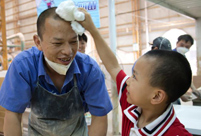 Children spend 'Father's Day' with dads at work
Children spend 'Father's Day' with dads at work 'Pan Da' appear in Shanghai World Financial Center
'Pan Da' appear in Shanghai World Financial Center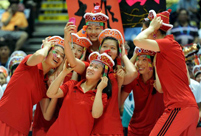 Champions take selfies on podium
Champions take selfies on podium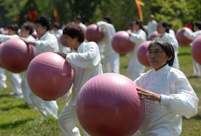 National Fitness Day celebrated around China
National Fitness Day celebrated around China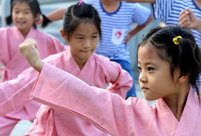 Traditional culture colors summer vacation
Traditional culture colors summer vacation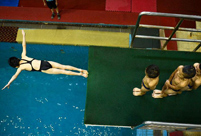 Young athletes fighting for their dreams
Young athletes fighting for their dreams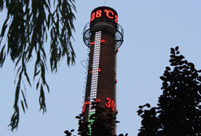 68 meters high thermometer in Shanxi, called ‘fighter’ of thermometers
68 meters high thermometer in Shanxi, called ‘fighter’ of thermometers 22-year-old veteran travels around China
22-year-old veteran travels around China
 Night scenery of pagoda forests
Night scenery of pagoda forests China suffers from hot summer
China suffers from hot summer 48 hours after super Typhoon Rammasun
48 hours after super Typhoon Rammasun German pianist plays mid-air ‘magic carpet’ show over Munich Airport
German pianist plays mid-air ‘magic carpet’ show over Munich Airport
 China's manned deep-sea submersible conducts dive in Pacific Ocean
China's manned deep-sea submersible conducts dive in Pacific Ocean
Day|Week|Month